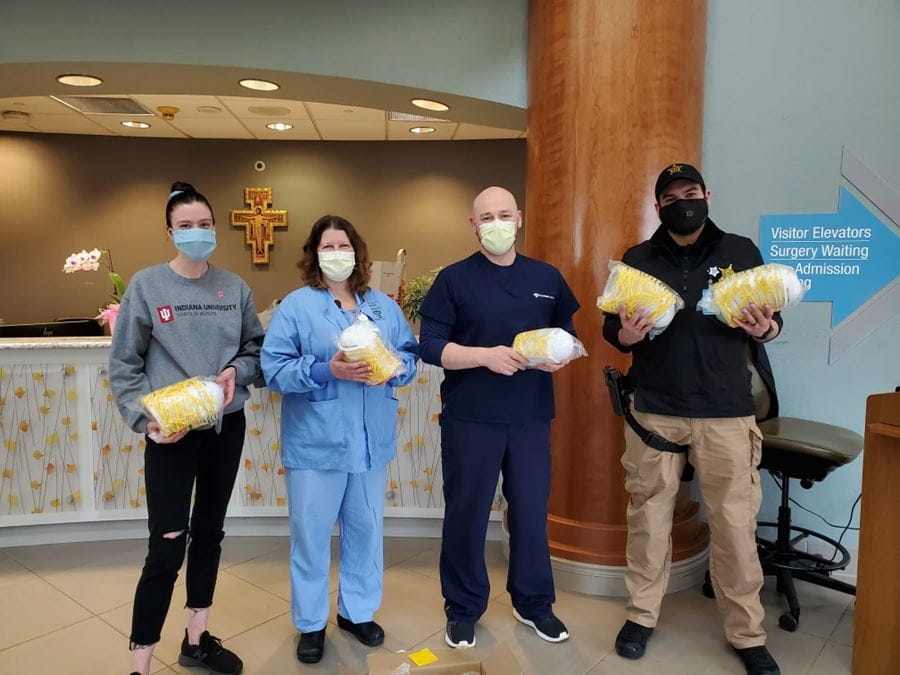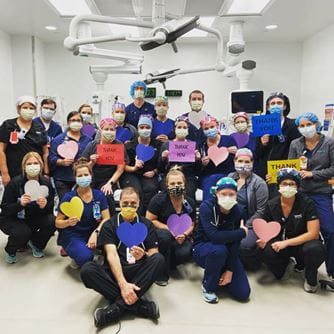Leave it to Indiana University School of Medicine students to take the lead on starting up nationally supported efforts in the fight against COVID-19. In many ways, medical students are uniquely positioned to serve as liaisons for volunteerism, coordinating efforts between IU School of Medicine volunteers and local health care facilities. Not only do they possess knowledge about medical care and delivery, but they also have connections at local hospitals through faculty mentors, shadowing and research.
“We have the connections and a deeper understanding of how things work,” said Madison Harris, the student leader behind GetMePPE Indiana. “We have students with diverse backgrounds in research, law, bio-engineering and more, and we have an extensive community of people who are willing to help.”
Thousands of donated N95 masks and other PPE, like surgical masks, face shields and nitrile gloves, have been distributed to frontline workers at hospitals and nursing facilities across the state thanks to the efforts of a small team of IU medical students.
Harris, a third-year student in Indianapolis, was the driver behind opening a GetMePPE chapter in Indiana. She reached out to organizers in places like Chicago, Philadelphia and New York, where the pandemic hit earlier, to study their models. While those groups focused on one metropolitan area, Harris decided to leverage IU School of Medicine’s nine-campus network to help the entire state.
“I’m always on the phone, emailing people and texting to make sure things are moving,” said Harris, who also is busy working on publications for the Emergency Medicine Department while having to direct online schooling for her two children. “I try to make the greatest use of my time and energy. I want to understand the needs so I can really make a difference and not just tell myself I’m making a difference.”
As the virus began to reach Indiana, Marion County was hit first, and many donations went to large hospitals in the Indianapolis area. As things progressed, Harris noticed inequity.
“Hospitals in lower income areas weren’t receiving all the donations our area hospitals were,” Harris said. “Our mission is to figure out who is getting left behind and how we can facilitate equitable protection.”
In addition to online donations from the community, GetMePPE Indiana has received grant funding from its national partner, GetUsPPE. Most of this funding is being directed to Lake County. IU School of Medicine-Northwest-Gary student Courtney Raab, who is mobilizing volunteers there, alerted Harris on the critically low PPE levels in the region.

Anna Fenner (left) delivering N95 masks to Franciscan Health Munster
Top: ED managers at Methodist Hospital Northlake-Gary, posing with a donation of 200 masks and 50 pairs of goggles
“We have coordinated and delivered thousands of face masks and face shields to local hospitals and nursing homes,” Raab said.
GetMePPE also is sending masks to Cass County, where there was a large COVID-19 outbreak in a meat packing plant.
“We’ve gone directly to state and county officials to find out who really has the highest need,” Harris said. “I have learned so much about local and state government, hospital governance and regulations. We want to donate what is needed, accepted and used.”
Maria Khan, who has joined Harris in this effort, says her classmate “has this save-the-world energy.”
“She is so closely living out what we’ve been taught with public health policy--asking the community what their needs are, doing all the research, working with community partners,” said Khan. “It’s fun to see what we’ve learned in action.”
Frontline Foods
Third-year medical student Megana Rao has been the driver behind another nationally backed effort. She heard about Frontline Foods from a friend in Denver and learned from social media that the organization wanted to start chapters in metropolitan regions in every state. The initiative provides meals to healthcare heroes while simultaneously supporting local restaurants. Donors make it possible for restaurants to deliver large orders to hospitals, feeding not only doctors and nurses but also supporting personnel like custodians and administrative staff.
“We all wanted to help our mentors at the hospitals, and we also saw local restaurants struggling. It’s been amazing to connect those two entities,” said Rao, who serves as city lead for the Indianapolis chapter of Frontline Foods--the only chapter founded and run by medical students. Assisting Rao on the core leadership team is Emily Sampson, who coordinates deliveries with five Indianapolis area hospitals, and Emma Ross and Lauren Bryant, who work with restaurants that want to provide meals. All are third-year medical students.
“We felt we had the time to dedicate to this,” said Sampson, noting that Step One of the medical licensing exam had been delayed, easing their studies. “I’ve really enjoyed doing this and seeing how grateful our hospitals are for our donations. It relieves a little bit of the stress they are feeling right now.”


Eskenazi Emergency Department thanks Frontline Foods
In one month of operation, beginning April 6, Frontline Foods Indy has delivered nearly 700 meals to area hospitals. More than $7,000 has been raised from about 65 donors, including corporate partners CuroGens and TCC Gives, which have been helping with marketing. Nine local restaurants have onboarded with more signing up daily.
“I feel really blessed to help these restaurants I’ve grown to love since living here, and I want to help them stay in business,” said Ross, who’s been reaching out to her favorites in the downtown area.
“Everyone is passionate about helping our healthcare workers and about food,” added Bryant. “This is something that not only affects everyone in the now, during COVID-19, but also could affect our community in the future if our restaurants go out of business.”
Frontline Foods-Indianapolis and GetMePPE Indiana are just two of the many efforts IU School of Medicine students have initiated and supported during the COVID-19 pandemic.
“I’m so proud of the way my IU School of Medicine colleagues--and also the larger Hoosier community--have come together to increase the health and wellness of our state,” said Khan. “I hope we’re able to decrease some of the negative effects of the pandemic with our efforts.”
